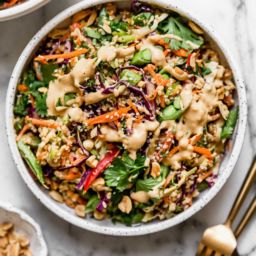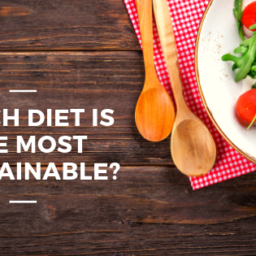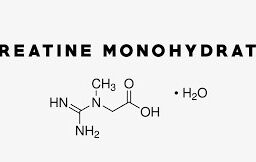With so many protein powders on the market, how do I know which one to choose?
I get this question a lot, so here are some tips on what to look for when selecting one.
Is Protein Powder Necessary?
The short answer is no; protein powders are not necessary. I’m not a huge fan of many supplements, and I believe you’re better off getting your nutrition from real whole foods instead of processed pills and powders, but I will say protein powder is a convenient way to add a little extra protein to your diet. And sometimes, having a protein shake blended with fruit is a great way to feel like you are eating dessert!
Advantages of Eating More Protein
Eating more protein can help curb your appetite, which can be helpful for weight management. It also helps support the growth and repair of muscle tissue, which can help you build and maintain muscle.
You can get more protein simply by adding more protein-rich foods to your diet: foods like eggs, cottage cheese, fish, meat, tofu, or legumes, but protein powders offer another convenient alternative. For example, many traditional breakfast foods are high in carbs and not that high in protein—particularly the ones you can grab in a hurry. Adding a scoop of protein powder to a smoothie or bowl of oatmeal is a quick and convenient way to get more protein into that first meal of the day.
Best Protein Powders
Protein powders are made of all kinds of things, but the most common sources are soy, egg whites, and whey. You’ll want to avoid protein powders made from those if you are allergic or otherwise intolerant of soy, eggs, or dairy. And vegans won’t want to use powders made from eggs or dairy. In addition to soy, there are vegan protein powders made from peas, hemp, and rice.
For those who consume animal products, whey is an economical source of high-quality protein.
If you Google the search phrase “what protein powder is best,” you’ll come across all kinds of stuff about glutamine-this, branched-chain-amino-acid-that, collagen, and superfoods. For those who merely aspire to look fit, the differences between various protein sources are not that significant. They can provide a good array of amino acids—the basic building blocks your body uses for growth and muscle repair.
Pros and cons of Different Protein powders
Egg whites: Egg whites are a source of high-quality, complete protein efficiently used in the body. However, protein powders made from egg whites tend to be expensive, and they don’t always taste the best.
Whey: Whey is a more economical source of high-quality protein. Whey, of course, is a by-product of cheese production…and because we eat a lot of cheese, there’s an abundant supply. Liquid whey is dried, purified, and concentrated into a high-quality protein powder. Although it may not be 100% lactose-free, whey protein powder is unlikely to cause problems for those with lactose intolerance.
Vegan Protein Powders
Soy protein: Among vegan protein powders, soy will give you the highest quality protein and has the added benefit of isoflavones—compounds that appear to help regulate cholesterol, reduce the risk of heart disease, and offer some protection against breast and prostate cancer. I recommend limiting your soy intake to two or three servings per day. If you include many other soy foods in your diet, you might not want to choose soy protein powder.
Vegan options other than soy, such as hemp, rice, and pea protein powders, tend to be substantially more expensive and not as concentrated or efficiently absorbed by the body. But they still offer vegans a convenient way to enhance their protein intake.
keep it simple
Whichever type of protein makes sense for you, look for a product with a minimum of bells and whistles. The goal of a protein powder is to add protein to your diet; you don’t need a powder that will also clean your house. You’ll pay a lot more for those fancy formulas with all the added vitamins, minerals, herbs, and extracts, but there’s no clear evidence that they add benefit.
Excess Protein is Stored as Fat
Finally, even though adding more protein to your diet may have some advantages, protein still contains calories, and excess calories will lead to weight gain. So, unless you’re trying to gain weight, you’ll need to subtract something else when you add protein. In this case, I think it makes the most sense to subtract some of the starches in your diet to make room for that extra protein. For example, you might want to add a scoop of protein powder to your smoothie but cut back on the cups of fruit you add or the side of toast you eat with it.
More questions?
If you have a question of the day or would like me to speak at your conference or event, send an email to aftannfit@gmail.com. You can also message me on Instagram or post a question of the day on my aftannFIT Facebook Page.
If you’re looking for a protein powder, I use and recommend Bad Athletics protein powder. Use code: aftann to save $$ at checkout






